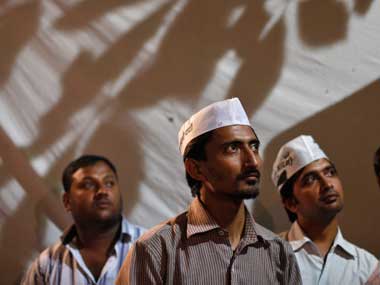Had the Aam Aadmi Party not announced its intention of contesting as many Lok Sabha seats from as many states as possible, it would have been injurious to the movement that culminated into the party forming the Delhi government. A movement’s euphoric moments help further drive its agenda. An election is always the best test of a political party’s real significance, the merits of its philosophy, and the extent of the support it enjoys. An election is also an event which apart from being a test by fire, also quantifies in understandable ways because of the votes secured and seats won. The Delhi foray of a fledgling party, high on moral angst at contemporary politics, politicians and how they have sabotaged several institutions, provided us with those understandable numbers - a little less than a third of all votes cast and a little more than a third of the seats on offer. [caption id=“attachment_1323661” align=“alignleft” width=“380”]  Reuters[/caption] This situation has of course jolted not only the Congress and the Bharatiya Janata Party, but also the space in public mind. It has also made, suddenly, the upcoming Lok Sabha elections possibly three cornered. This could also play out in states with strong regional parties which are perceived to have the same base of political morals as the Congress and BJP. Being regional does not make them any different. There is a palpable, marked change in the political atmospherics of the country. In many places when the enrollment on the voters’ lists started, people queued up with greater enthusiasm than ever before. People advanced two reasons for this enthusiasm – one, there was a need for change, and two, Narendra Modi seemed to be offering that opportunity. That route to change is now suddenly at a Y-junction with the AAP offering, at least as of now, another conceptually valid option. The manner in which it has crowded out the BJP and Modi is one significant shift of some measure. But getting voters to exercise that option could be a task. Enthusiasm has to convert to votes. Should the AAP accept politicians from other political parties as its candidates because they are incorrectly seen as having a winning chance, given the moral high it is riding, the move would probably disfavour the party. But for the common man to rise and contest and secure votes in larger Lok Sabha constituencies is a lot tougher. Prashant Bhushan, has in the past two days spoken of two aspects of note. One is that the candidates would be “from among us” meaning the aam aadmi, and two, that other political parties can share the election process with them only by merging the parties with AAP and not through alliances. Being a key leader, Bhushan can be taken seriously, but remember that this is the same person who expressed his “personal view” that his party could support the BJP, which emerged as the single largest party, to form the government but was shot down by the rest. The AAP needs to formally announce that as a decision of its national executive to carry conviction. The flood of people joining AAP is one positive thing going for it, but if that flood includes politicians of other parties – remember Kamal Farooqui of Samajwadi Party meeting Kejriwal, and former BJP hand Kanu Kalsaria who before opting for AAP had preferred the Congress? – the AAP’s voters may realise with dismay that AAP and its candidates are not kosher, that is, not quite aam. Setting up as a strong a network of workers as Delhi which saw volunteers flooding in from across the country and overseas, and enlarging it to cover wider geographies is the immediate task. Not picking candidates. In fact, the second has to precede operational moves. Those who funnelled themselves into Delhi would be sparse when distributed across constituencies. In short, while euphoria is quite well placed, the nuts and bolts have to be put in place in quite a hurry with a clear screening process with simultaneous affirmation of stand with regard to who can be its candidates. More importantly, it also need decide if it needed any other political party at all as a prop. That is, keep it as a people’s war against the establishment. Quick additions for short term gains would sap the vitals of the idea of them versus us which alone made Delhi victory – it is that despite being a runner up but in power – and make a potential marathon runner a mere sprinter for 2014.
Had the Aam Aadmi Party not announced its intention of contesting as many Lok Sabha seats from as many states as possible, it would have been injurious to the movement that culminated into the party forming the Delhi government. A movement’s euphoric moments help further drive its agenda. An election is always the best test of a political party’s real significance, the merits of its philosophy, and the extent of the support it enjoys.
Advertisement
End of Article
Written by Mahesh Vijapurkar
Mahesh Vijapurkar likes to take a worm’s eye-view of issues – that is, from the common man’s perspective. He was a journalist with The Indian Express and then The Hindu and now potters around with human development and urban issues. see more


)
)
)
)
)
)
)
)
)



